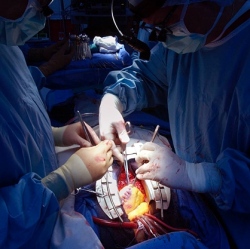
How revolutionary, you ask? What about detecting a tumour way before it metastasizes? Or powering a radiotelescope that could put us in contact with alien civilizations?
That’s exactly what Dr. Oxborrow told BBC News:
Perhaps the one application that is most relevant is more sensitive forms of body scanners. Sensitivity matters with body scanners, because detecting a tumour before it metastasizes is so useful. If this device can make even just a slightly more sensitive body scanner, it could put smiles on people’s faces – they’ll still be around to smile.
Let’s dream here: you could make a radio telescope that was very low-noise, 100 times more sensitive than the best at the moment… this type of maser could be used to detect some extraterrestrial intelligence that hasn’t been detected.
The key to Dr. Oxborrow’s team discovery is the extreme simplicity of this new electronics device. While masers are not new—the first ones were invented in the ’50s—they were impractical. One type required extreme magnetic fields, vacuum and ultra-low pressures. The other required temperatures that approached absolute zero. They required huge magnets, vacuum chambers and special refrigerant liquids made them impractical for everyday applications.
But this new maser doesn’t require any of that. They work at room temperature and don’t require any special conditions. They work thanks to a new crystal developed at the NPL, called doped p-terphenyl (above). Thanks to this crystal, masers may become as ubiquitous as lasers in the near future. And because they can work through clouds or flesh, its applications could be seen as nothing sort of miraculous. In fact, Dr. Oxborrow says that we still can’t imagine many of its potential applications.
